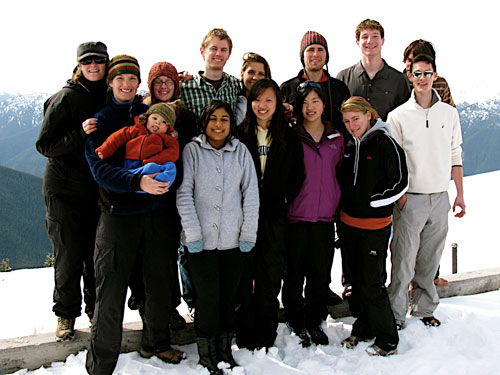 |
|||
| Undergraduate Academic Affairs Home | News | Make a Gift | UW Alumni | |||
|
April 2010 | Return to issue home
Honors Program Launches New Curriculum
This fall, as it has each fall since 1961, the Honors Program will welcome a new class of freshmen. This class, however, will be the first to experience the Honors Program’s new core curriculum that emphasizes the principles of community, diversity, leadership, lifelong learning, global and community engagement and research beyond traditional advanced courses. Up to this point, Honors students completed College Honors or Departmental Honors and graduated "with College Honors" or "with Distinction," respectively. The new curriculum adds an additional track: Interdisciplinary Honors, a new comprehensive core curriculum. The new core curriculum is designed so students expand the boundaries of their knowledge and connect what they learn through their general education courses across disciplines. To graduate "with College Honors," students must complete Departmental Honors along with the Interdisciplinary Honors track. Students who complete Interdisciplinary Honors but not Departmental Honors will have a designation on their degree noting the rigor of their general education curriculum. Honors 100, a mandatory course for all students their first quarter of their first year in the program, will prepare students for the expectations in the Honors Core Curriculum. Developed with the assistance of UW Librarians, Honors 100 requires a learning portfolio in which students reflect on learning and thinking within and across disciplines and make connections between experiential learning opportunities, classroom experiences, and their future studies, careers and civic engagement. To illustrate the notion that disciplinary boundaries are more porous than students may realize and that scholarly approaches to diverse areas of study are often more similar than different, faculty lecturers from different disciplines will speak to Honors 100 classes about their various methodological strategies and how their work crosses disciplines. Honors 100 also prepares students in the Interdisciplinary and College Honors for the two mandatory experiential learning projects in research, leadership, service or international study. The final piece, after completing nine Honors courses and a portfolio, will be Honors 496, a capstone course. Led by UW Librarians and student peer mentors, the last component of the Honors Portfolio will be the basis for a class presentation about how thinking happens within and beyond disciplines, their experiential learning activities, and how the integration of these two components situates them for work in their majors and in life beyond the classroom. Students accepted into the Honors Program are indeed among the best and brightest and competition is fierce. But a holistic approach to reading applications means that the high school valedictorian who earned 1600 on the SAT, has a 4.0 GPA and participates in a lot of extracurricular activities is no longer a shoe-in for the program. Students must demonstrate in their essays an interest in pursuing a broad-based education and goals that include and transcend a future career. Surveys of UW Honors Program participants have shown repeatedly that students entering the program looking for a fast track to graduate or professional school but without commitments to a well-rounded education, serving communities as leaders and engaging the world as global citizens, either end up leaving or completing Honors with less satisfaction than anticipated. Students who commit to a broader concept of a college education uniformly report that they have been transformed by the experience. It is this quality that makes the University of Washington Honors Program truly distinctive.April 2010 | Return to issue home | |||
|
|||
